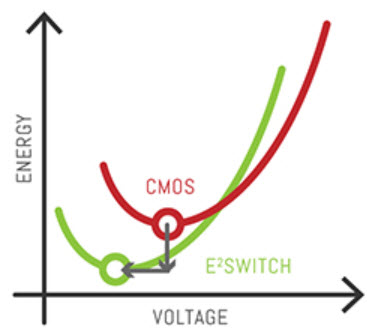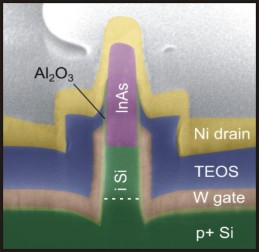Ultra-low-energy-consuming transistors and circuits
September 29, 2014

Concept for energy-efficient tunnel FET (field effect transistor) switches and circuits (credit: E2 SWITCH)
European project E2SWITCH is developing new electronic systems with ultra-low energy consumption, based on tunnel FET (TFET) heterostructures for switches (transistors) and circuits.
The idea is to design that will be built on silicon substrates but designed to operate at voltages that are up to five times lower than those used in mobile phones, while reducing thermal dissipation.
Transistors and circuits based on lower voltages result in reduced energy expenditures compared to current CMOS technology.
The EPFL is coordinating this new European research project, which involves six universities and research institutes, and companies IBM, CCS, and SCIPROM.
“Our objective is to make the next generation of transistors, [designed to] operate at voltages below 0.3 Volts and even as low as 0.1V,” explained Adrian Ionescu, an EPFL professor and the coordinator of E2SWITCH.
Mobile devices such as smart phones will be the first components to take advantage of such optimized electronics. along with sensors for gas and temperature and future computing systems, especially for cloud and big data applications using huge banks of servers, which represent a growing proportion of global electricity costs.
“Power dissipation is a fundamental challenge for nanoelectronic circuits,” said Heike Riel, IBM Fellow, IBM Research – Zurich.
“Within E2SWITCH we aim to significantly reduce the power consumption of electronics by researching TFETs based on III-V heterostructure nanowires with wrap-around gate and directly integrated on standard silicon substrates.”
The Universities of Udine and Bologna (Italy), IMEC (Belgium), Forschungszentrum Jülich (Germany), Lund University (Sweden) and ETH Zurich (Switzerland) are also involved.
E2SWITCH is funded by 4.3 million euros under the 7th Framework Programme for Research and Development of the European Union. The first research advancements were presented at the 44th European Solid-State Device Conference (ESSDERC 2014) on September 26.
Abstract for “In the Quest of Zero Power: Energy Efficient Computing Devices and Circuits”
